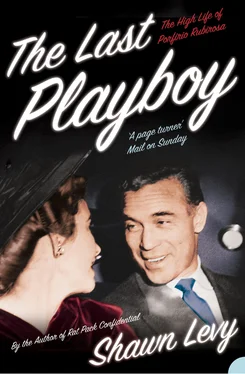Even as he forgave that trespass, Trujillo harbored little warmth for his son-in-law. “I think that at bottom he never forgave me for marrying his daughter,” Porfirio surmised. “That his daughter could love someone other than him seemed impossible to him.” The president’s withering remoteness, coupled with Porfirio’s own restless inability to settle into the life of a bureaucrat, impelled him to ask for reinstatement to the Army, where he’d so enjoyed the life of vigor and male camaraderie. Trujillo consented, posting him at the rank of captain, assigning him no specific duties, and doing little to couch his disgust at Porfirio’s apparent contentment with his new station.
The source of the president’s contempt was, in Porfirio’s view, obvious: Little Ramfis had been commissioned as a senior officer in the Army the previous year; as Porfirio put it, “What sort of son-in-law would be content to be captain when [Trujillo’s] own five-year-old son was already a colonel?” (A letter from Robert L. Ripley’s “Believe It or Not” offices in New York would arrive on Trujillo’s desk in February 1936, seeking confirmation of Ramfis’s position in the Army and asking whether he wore full uniform and collected the appropriate salary for his rank. By that time, the young soldier had been seen beside his father at several official functions wearing elaborate military uniforms and partaking of champagne toasts.)
But Porfirio endured the Benefactor’s scorn because he simply wanted to be his own man. Without responsibilities as a soldier, he could look for private opportunities around the city. “I had very little to do,” he recalled, “and I wanted to learn about business.” But, as he should have known from his brief stint at the insurance company, nobody did business in Ciudad Trujillo without doing business with Trujillo. And it was a uniquely bold and crafty businessman indeed who could make a success at that.
Félix Benítez Rexach wore his hair to his shoulders, wasn’t too particular about washing or combing it, and habitually topped it with battered straw hats. His clothes weren’t much more presentable: He could show up at official functions in torn and muddy outfits as if oblivious entirely to protocol. He looked for all the world like a hobo, but it was a calculated guise. He was actually a millionaire engineer willing to stand up to gangsters and governments to see his business interests come to fruition. Born in Puerto Rico, he traveled widely and grew especially fond of France, where he owned homes in Paris and on the Riviera. There was suspicious talk about his sexuality, but he had two wives, the second being the onetime Parisian flower girl Gaby Montbre, who had a sort-of musical career as La Môme Moineau (literally, “the bratty sparrow”), a chanteuse in the vein of Edith Piaf. There was suspicious talk as well about his engineering credentials, but he had built himself a yacht from his own design (his wife would become more famous for being photographed by French magazines on its decks in sailing clothes than for her singing), and he had successfully overseen the creation of deep-water harbors in Puerto Rico, where he had additional interests in the resort hotel business.
Benítez Rexach showed up in Ciudad Trujillo in 1934 when Trujillo’s government announced plans to enlarge the harbor at the mouth of the Ozama River; until then, the largest ships arriving in the capital had to anchor a short distance out at sea and have their passengers and cargo ferried ashore. The project would require the use of a massive shipboard dredge—and whoever successfully completed the job could hope on doing further business with Trujillo at other ports around the country.
Benítez Rexach read all the implications of the situation, including the nepotistic nature of Dominican political and business affairs, and he sought a pry hole that would get him into the president’s good graces. He found one in Trujillo’s tomcatting son-in-law. He dangled his wife as bait in front of Porfirio, cynically affording him ample opportunity to sample her favors. (Flor knew about the affair and so, she claimed, did the whole city, including her father.) To tie the knot tighter, Benítez Rexach suggested a business partnership: If Porfirio acquired a dredge, and Benítez Rexach knew of one available in New Orleans, then the engineer would rent it for the duration of the job; they drew up an agreement.
For Benítez Rexach, it was politics: cozen the son-in-law to get to the real power. But for Porfirio and Flor, it was a lifeline—and a gamble. “Neither of us had much business sense,” Flor recalled. She and her husband “were alike in so many ways, neither of us really good-looking, both mixed-up Dominicans, in love with the high life, hungry for what money could buy, but unable to earn an honest living on our own.” Success in the harbor project, however, would mean autonomy from Trujillo’s money and influence. The risk was worth it.
The first obstacle would be getting the capital necessary to buy the dredge. Flor’s father still controlled the $50,000 dowry; would he be willing to open the purse for the project? Willing wasn’t exactly the word. “I don’t have much faith in second-hand machinery or in this investment,” the president told his daughter even as he agreed to her request. Rubi sent an emissary, cash in hand, to buy the dredge, a vessel called the Tenth of February , and bring it back to Ciudad Trujillo.
While he was risking his fortune and good name, such as they were, in this scheme, Porfirio was also upholding his share of the bargain he’d struck with Benítez Rexach, establishing a connection between the engineer and Trujillo. Eventually, the two men so bonded that an intermediary was unnecessary; Benítez Rexach sufficiently impressed Trujillo, in fact, that he was routinely forgiven the effrontery of strolling into the immaculate palace in his grubbiest condition and eventually enjoyed brief appointments from the president in the diplomatic service in France and Puerto Rico.
With these two in cahoots, it was only a matter of time before Porfirio was frozen out. The blindside was delivered with an assassin’s cunning. By the time the Tenth of February was in Ciudad Trujillo and ready to dig, Benítez Rexach had acquired a brand-new dredge of his own for the job and had convinced Trujillo of the superiority of his vessel to Porfirio’s. But Porfirio had the engineer’s signed promise to use his equipment, and he demanded that it at least be tested. In the coming weeks, Benítez Rexach submitted the Tenth of February to trials but sabotaged them at every turn: He claimed that the dredge wouldn’t function properly in the tropical weather; he insisted that it first be tried in the most ill-suited portion of the harbor; he whispered to Trujillo that its gas-powered engine might ignite and blow up the whole port.
Porfirio, suffering one of his father-in-law’s periodic silent treatments, couldn’t get a hearing. He could see that he was being shut out of the operation, and he was realistic enough to wish only to recoup the lease money he’d been promised so as to repay Trujillo for the dredge. Even that much Benítez Rexach refused, and so Porfirio took decisive action. In his full captain’s uniform, complete with sidearms, he rode a launch out to the work site in the harbor and accosted the engineer. “I leapt at him, grabbed him by the collar and shook him like a carpet,” Porfirio remembered. “‘Thief! If you continue waging war against me and don’t pay me right now what you owe me, I will destroy you!’ He was terrified. He collapsed. He promised everything I wanted.”
But as soon as Porfirio left, Benítez Rexach raced to tell Trujillo that he would have to quit working on the harbor improvements for fear that Porfirio would kill him. Trujillo offered reassurance: “Four officers of my guard will accompany you and let Captain Rubirosa know what it will cost him if he touches one hair on your head.” The operation continued without further hindrance while the Tenth of February sat unused and worthless. As a Dominican businessman—indeed, as a Dominican man —Porfirio was toast.
Читать дальше












